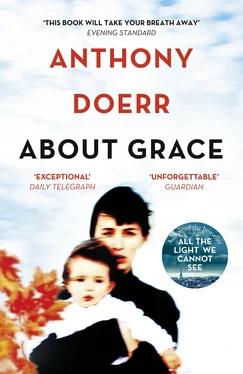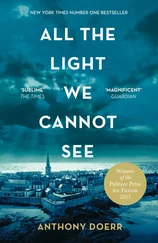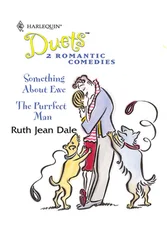He waded down the steps of the front walk. Soon the water was to his belt and he held Grace high against his shoulder with both arms and fought the current. Her breath was small in his ear. His own breath stood out in front of them in short-lived clouds of vapor.
His clothes were drenched and he had begun to shiver. The force of water—slow, but heavy with sediment and sticks and whole clumps of turf—pushed resolutely at his thighs and he felt it trying to raise his feet and carry them away. A hundred yards up the street, behind the Stevensons’ place, a small blue light winked among the trees. He glanced back at the entrance to his own house, dark, already far away.
“Hang on, Grace,” he said. She did not cry. From the location of the telephone poles standing in the dimness he could discern where the sidewalk was and made for it.
He clawed his way up the street, hanging with one arm on to lampposts and the trunks of trees and pulling himself forward as if up the rungs of an enormous ladder. He would reach the blue light and save them. He would wake, safe and dry, in his bed.
The flood hissed and murmured, a sound like blood rising in his ears. The taste of it was in his teeth: clay and something else, like rust. Several times he thought he might slip and had to stop, propped against a mailbox, spitting water, clutching the baby. His glasses fogged. His legs and feet were numb. The flood sucked at his boots.
The light behind the Stevensons’ wavered and blinked and rematerialized as it passed behind obstacles. A boat. The water was not as deep up here. “Help!” he called. “Help us.” Grace was quiet: a small weight against his wet shirt. Far away, as if from a distant shore, sirens keened.
A few steps later, he stumbled. Water surged to his shoulders. The river pushed at him the way wind pushes at a sail and all his life, even in dreams, he would remember the sensation: the feeling of being overwhelmed by water. In a second he was borne away. He held Grace as high as he could and clamped her little thighs between his palms, his thumbs in the small of her back. He kicked; he pointed his toes and tried to find bottom. The upper halves of houses glided past. For a moment he thought they would be carried all the way down the street, past their house, past the cul-de-sac, and into the river. Then his head struck a telephone pole; he spun; the current washed them under.
The evening had gone to that last blue before darkness. He tried to hold Grace above his chest, her little hips in his hands; his own head stayed under.
His shoulders struck submerged sticks, a dozen unseen obstacles. The undercurrent sucked one of his boots off. A few hundred feet down the block they passed into an eddy, full of froth and twigs, and he threw his legs around a mailbox—the last mailbox on the street. Here the flood coursed through wooded lots at the terminus of the street and merged with the swollen, unrecognizable Chagrin River. There, somehow, he managed to stagger to his feet, still holding Grace. A spasm tore through his diaphragm and he began to cough.
The bobbing, shifting point of light that had been by the Stevensons’ was miraculously closer. “Help us!” he gasped. “Over here!”
The mailbox swiveled against his weight. The light drew nearer. It was a rowboat. A man leaned over the bow waving a flashlight. He could hear voices. The mailbox groaned against his weight. “Please,” Winkler tried to say. “Please.”
The boat approached. The light was in his face. Hands had ahold of his belt and were hauling him over the gunwale.
“Is she dead?” he heard someone ask. “Is she breathing?”
Winkler gulped air. His glasses were lost but he could see that Grace’s mouth hung open. Her hair was wet, her yellow cap gone. Her cheeks had lost their color. He could not seem to relax his arms—they did not seem like his arms at all. “Sir,” someone said. “Let her loose, sir.”
He felt a scream boiling up in his throat. Someone called for him to let go, let go, let go.
This was a dream. This had not happened.
Memory gallops, then checks up and veers unexpectedly; to memory, the order of occurrence is arbitrary. Winkler was still on an airplane, hurtling north, but he was also pushing farther back, sinking deeper into the overlaps, to the years before he even had a daughter, before he had even dreamed of the woman who would become his wife.
This was 1975. He was thirty-two years old, in Anchorage, Alaska. He had an apartment over a garage in Midtown, a 1970 Chrysler Newport, few friends, no family left. If there was anything to notice about him, it was his eyeglasses: thick, Coke-bottle lenses in plastic frames. Behind them his eyes appeared unsubstantial and slightly warped, as if he peered not through a half centimeter of curved glass but through ice, two frozen pools, his eyeballs floating just beneath.
It was March again, early breakup, the sun not completely risen but a warmth in the air, blowing east, and with it the improbable smell of new leaves, as if spring was already happening to the west—in the Aleutian volcanoes or all the way across the strait in Siberia—the first compressed buds showing on whatever kinds of trees they had there, and bears blinking as they stumbled from their hibernal dens, whole festivals starting, nighttime songs and burgeoning romances and homages to the equinox and the first seeds being sown—Russian spring blowing across the Bering Sea and over the mountains and tumbling into Anchorage.
Winkler dressed in one of his two brown corduroy suits and walked to the small brick National Weather Service office on Seventh Avenue where he worked as an analyst’s assistant. He spent the morning compiling snowpack forecasts at his little veneered desk. Every few minutes a slab of snow would slide off the roof and plunge into the hedge outside his window with a muffled whump.
At noon he walked to the Snow Goose Market and ordered a salami and mustard on wheat and waited in a checkout lane to pay for it.
Fifteen feet away a woman in tortoiseshell glasses and a tan polyester suit stopped in front of a revolving rack of magazines. Two boxes of cereal and a half gallon of milk stood primly in her basket. The light—angling through the front windows—fell across her waist and lit her shins below her skirt. He could see tiny particles of dust drifting in the air between her ankles, each fleck tumbling individually in and out of sunlight, and there was something intensely familiar in their arrangement.
A cash register clanged. An automatic fan in the ceiling clicked on with a sigh. Suddenly he knew what would happen—he had dreamed it four or five nights before. The woman would drop a magazine; he would step over, pick it up, and give it back.
The cashier handed a pair of teenagers their change and looked expectantly at Winkler. But he could not take his eyes from the woman browsing magazines. She spun the rack a quarter turn, her thumb and forefinger fell hesitantly upon an issue ( Good Housekeeping , March 1975, Valerie Harper on the cover, beaming and tan in a green tank top), and she picked it up. The cover slipped; the magazine fell.
His feet made for her as if of their own volition. He bent; she stooped. The tops of their heads nearly touched. He lifted the magazine, swiped dust off the cover, and handed it over.
They straightened simultaneously. He realized his hand was shaking. His eyes did not meet hers but left their attention somewhere above her throat. “You dropped this,” he said. She didn’t take it. At the register a housewife had taken his place in line. A bagboy snapped open a bag and lowered a carton of eggs into it.
“Miss?”
She inhaled. Behind her lips were trim rows of shiny teeth, slightly off-axis. She closed her eyes and held them shut a moment before opening them, as if waiting out a spell of vertigo.
Читать дальше












